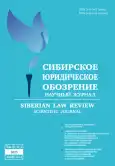Exploring the Category of the Subject of Law
- Authors: Kovalenko N.E.1
-
Affiliations:
- Altai State University
- Issue: Vol 22, No 2 (2025)
- Pages: 173-184
- Section: THEORETICAL AND HISTORICAL LEGAL SCIENCES
- Published: 07.07.2025
- URL: https://journal-vniispk.ru/2658-7602/article/view/340025
- DOI: https://doi.org/10.19073/2658-7602-2025-22-2-173-184
- EDN: https://elibrary.ru/AZNOYQ
- ID: 340025
Cite item
Full Text
Abstract
The legal system possesses a distinctive language through which the essence of law is articulated. This pertains primarily to legal language, which legal scholars explore in three dimensions: within legal science; as a practical component of jurisprudence; and as a medium of expressing law itself. This paper proposes to examine the features of legal language through a focused case study – namely, the concept of the subject of law. The relevance of the study lies in identifying a doctrinal approach to the concept of the subject of law, which is essential for a clear understanding of its nature in the context of the information society, where distinctions between the subject and object of legal relations have increasingly blurred. The aim of this research is to explore the phenomenon of the subject of law and to analyze approaches taken by foreign legal scholars. The study seeks to develop a general understanding of this concept within foreign legal systems, to identify the lexical forms in which it is expressed, and to outline the terminological diversity associated with it. The Author employs comparative legal, historical, dialectical, formallegal, and logical methods, along with legal analysis. The study finds that foreign legal literature reflects an ambiguous understanding of the subject of law; it frequently equates the subject with legal personality. Notably, transformations in societal life are accompanied not only by the expansion of communication and information flows but also by the introduction of digital technologies. The absence of a unified theoretical framework for subjectivity (the theory of the subject) has devalued this category, adversely affecting the development of legal theory as well as legislative and law enforcement practices. Continued research into this category appears both necessary and promising, particularly with the aim of formulating recommendations for legislators on the development of legal norms governing legal subjects. The study concludes that the subject of law is characterized by a dual nature: on the one hand, it is a person; on the other, it is a legal construct formalized in normative legal texts. This duality has not previously been sufficiently addressed in legal doctrine.
About the authors
Natalya E. Kovalenko
Altai State University
Author for correspondence.
Email: kovalenkorub5@gmail.com
ORCID iD: 0000-0003-4961-9480
Junior Researcher of the Laboratory for Legal Regulation of Scientific and Innovative Activity, Postgraduate Student of the Department of Theory and History of State and Law
Russian Federation, 61 Lenin pr., Barnaul, 656045References
- Cherdantsev A. F. Logical and Linguistic Phenomena in Law, Legal Science, and Practice. Moscow: Norma Publ., INFRA-M Publ.; 2012. 319 p. (In Russ.) (In Russ.)
- Zaloilo M. V. The Subject of Law and the Dynamics of Its Legal Status in the Context of Digitalization. MCU Journal of Legal Sciences. 2021;3:104-120. https://doi.org/10.25688/2076-9113.2021.43.3.12 (In Russ.)
- Vlasenko N. A. Methodological bases for the research of legal values. Moscow: Norma Publ.; 2023. 197 p. https://doi.org/10.12737/2007818 (In Russ.)
- Orzikh M. F. Personality and Law. Moscow: Yuridicheskaya literatura Publ.; 1975. 111 p. (In Russ.)
- Komarov S. A. The Soviet All-People’s State and the Individual: Political and Legal Aspects. Krasnoyarsk: Krasnoyarsk University Publ.; 1986. 135 p. (In Russ.)
- Chirkin V. E. On Notion and Classification of Legal Person of Public Law. Journal of Russian Law. 2010;6:87- 101. (In Russ.)
- Alekseev N. N. Fundamentals of the Philosophy of Law. St. Petersburg: Lan’ Publ.; 1999. 251 p. (In Russ.)
- Tikhomirov Yu. A. Law: Traditions and New Occasions. Moscow: Blok-Print Publ.; 2023. 208 p. (In Russ.)
- Petrażycki L. I. Theory and Policy of Law: Selected Works. St. Petersburg: Yuridicheskaya kniga Publ.; 2010. 1031 p. (In Russ.)
- Frow J. The Subject of Law. In: Wickham G. (Ed.). Social Theory and Legal Politics. Sydney: Local Consumption Publications, 1987. P. 68-70.
- Arstein-Kerslake A., O’Donnell E., Kayess R., Watson J. Relational Personhood: a Conception of Legal Personhood with Insights from Disability Rights and Environmental Law. Griffith Law Review. 2021;30(3):530-555. https://doi.org/10.1080/10383441.2021.2003744
- Adriano E. A. Q. Natural Persons, Juridical Persons and Legal Personhood. Mexican Law Review. 2015;8(1):101-118. https://doi.org/10.1016/j.mexlaw.2015.12.005
- Mitskevich A. V. Selected Works. Moscow: Institute of Legislation and Comparative Law under the Government of the Russian Federation Publ.; 2010. 304 p. (In Russ.)
- Vasilevskaya L. Yu., Poduzova E. B., Tasalov F. A. Digitalization of Civil Turnover: Legal Characterization of “Artificial Intelligence” and “Digital” Subjects (A Civil Law Study). Vol. III. Moscow: Prospekt Publ.; 2021. 287 p. (In Russ.)
- Anichkin E. S. Modernization of the Constitutional Law Status of an Individual in the Conditions of Cyberspace Establishment. Constitutional and Municipal Law. 2019;12:19-22. (In Russ.)
- Arkhipov V. V., Naumov V. B. Artificial Intelligence and Autonomous Devices in Legal Context: on Development of the First Russian Law on Robotics. SPIIRAS Proceedings. 2017;6:46-62. https://doi.org/10.15622/sp.55.2 (In Russ.)
- Vasilev A. A., Szpoper D. Artificial Intelligence: Legal Aspects. Izvestiya of Altai State University. 2018;6:23- 26. https://doi.org/10.14258/izvasu(2018)6-03 (In Russ.)
- Khabrieva T. Y. Introduction. In: Yakovlev V. F., Khabrieva T. Y., Andreev V. K. etc. Legal Personality: the Collection of Materials for the XII Annual Scientific Readings in Memoriam of Professor S. N. Bratus. Moscow: Institute of Legislation and Comparative Law under the Government of the Russian Federation Publ., Statut Publ.; 2017. P. 21-28. (In Russ.)
- Zaloilo M. V. Post-Industrial Culture of Law-Making: a New Image of Reality. Courier of the Kutafin Moscow State Law University (MSAL). 2022;4:65-73. https://doi.org/10.17803/2311-5998.2022.92.4.065-073 (In Russ.)
- Landkof S. N. Legal Subjects (Persons). Moscow: Legal Publishing House of the People’s Commissariat of Justice of the RSFSR, 1928. 63 p. (In Russ.)
Supplementary files












